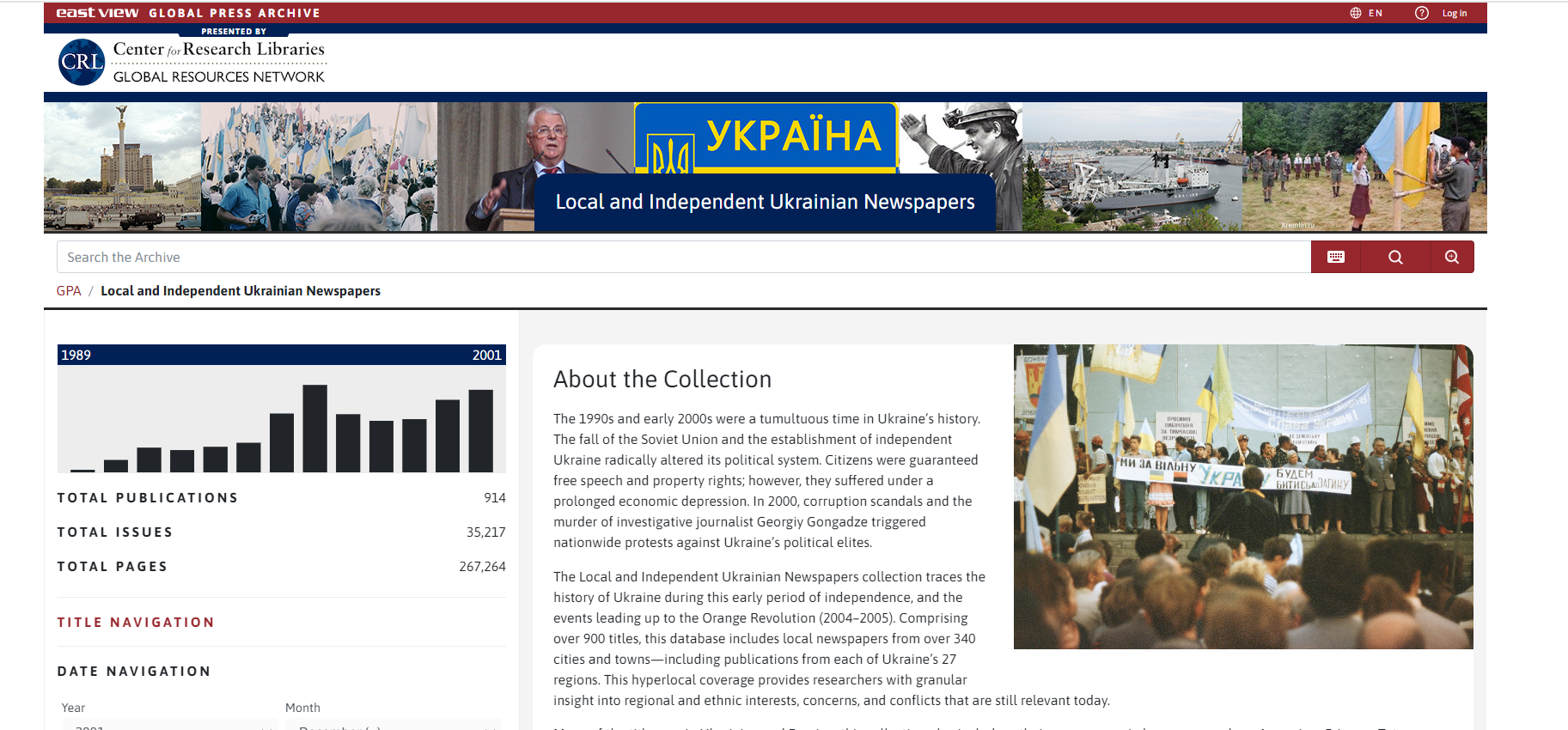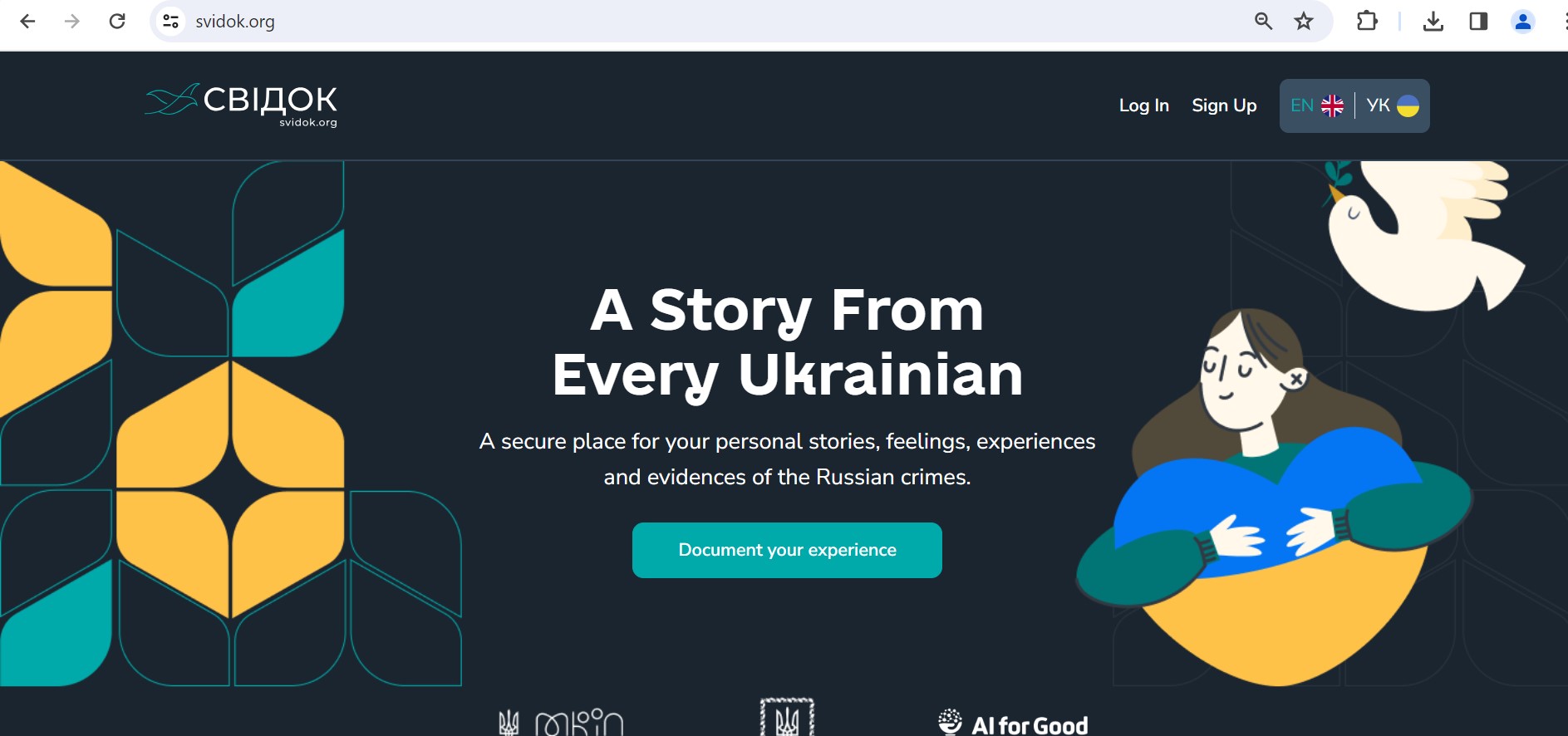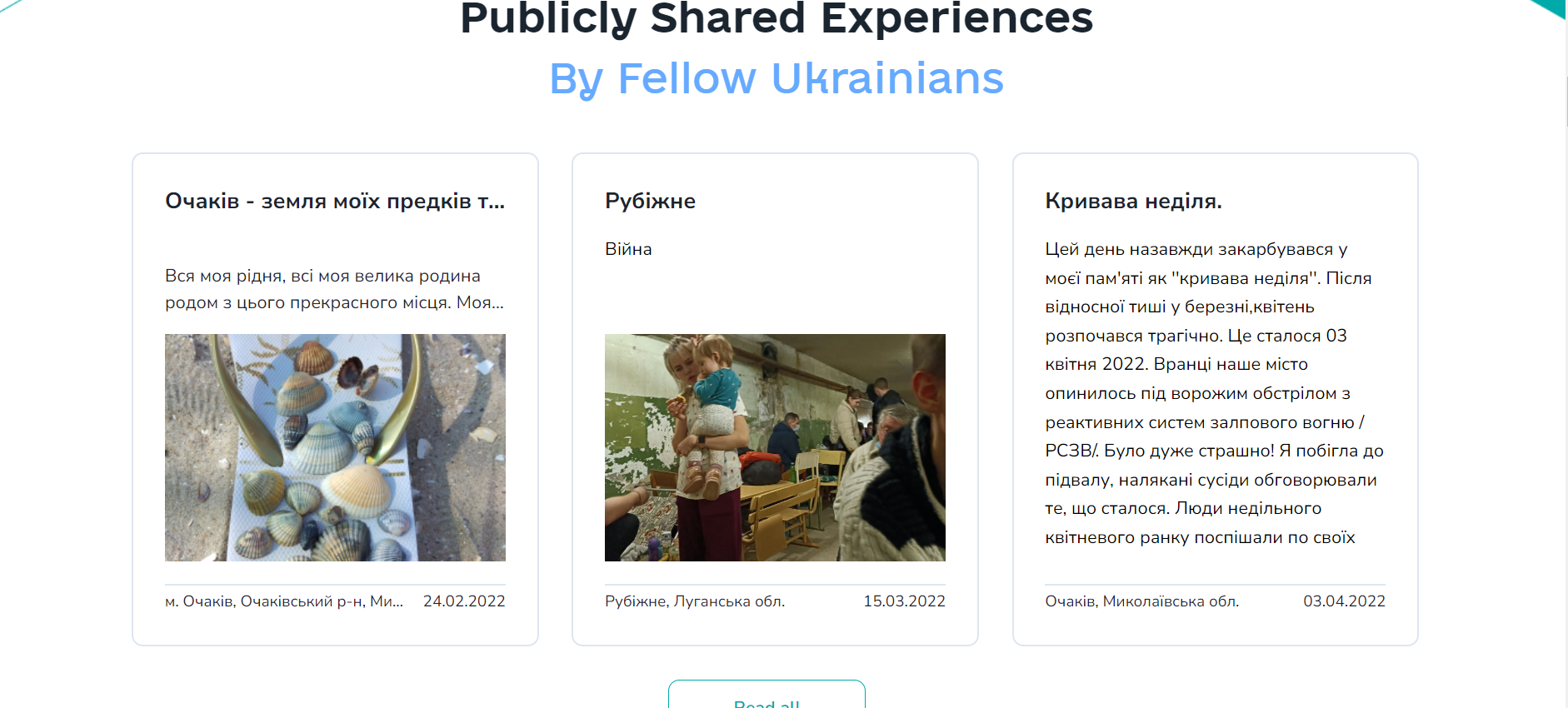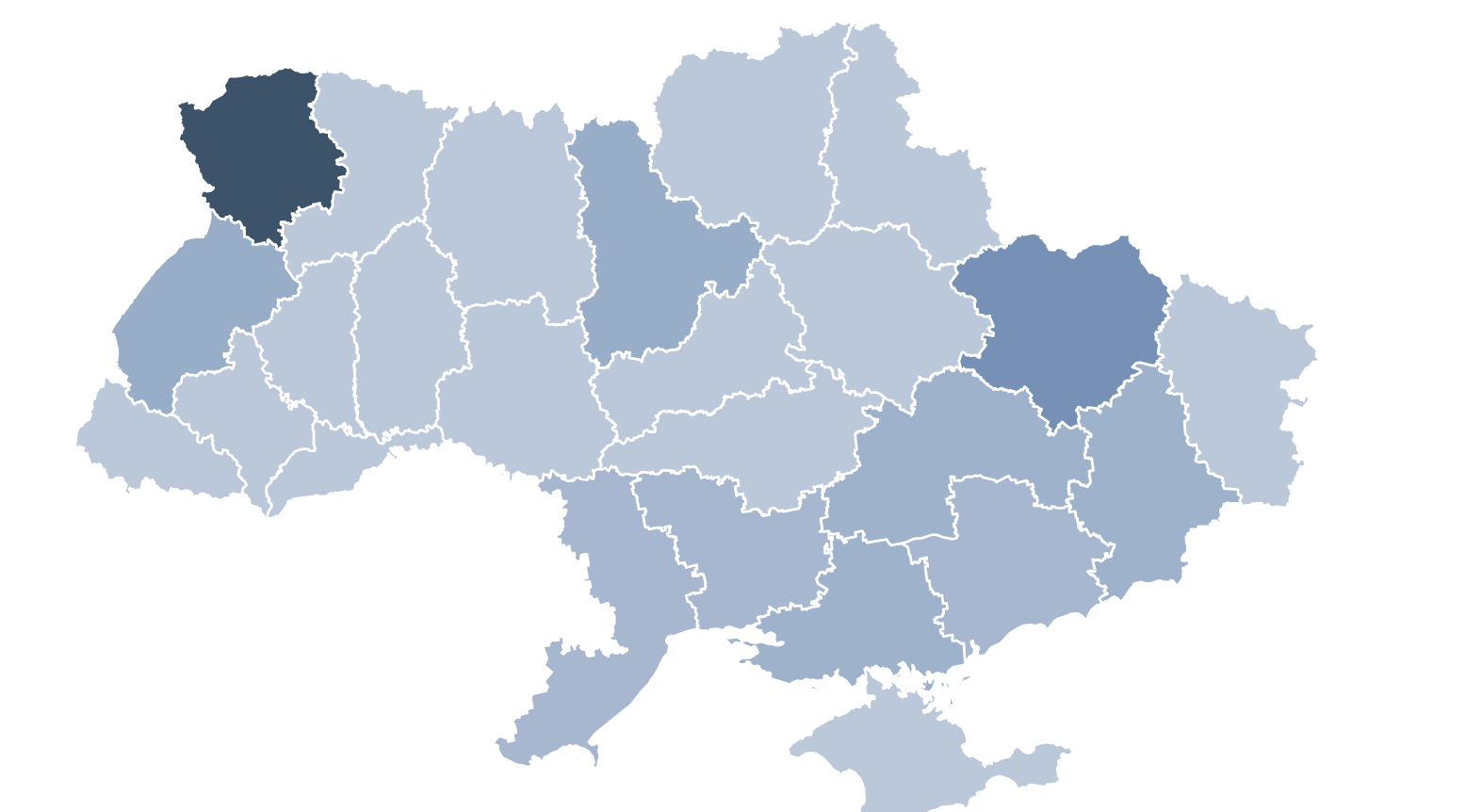Slavic, East European, and Eurasian Studies
Local and Independent Ukrainian Newspapers on Global Press Archive Electronically Available
The 1990s and early 2000s marked a turbulent period in Ukraine’s history due to the fall of the Soviet Union and the emergence of an independent Ukraine. Despite gaining free speech and property rights, citizens faced economic hardships. Corruption scandals and the murder of journalist Georgiy Gongadze in 2000 sparked nationwide protests against the political elite. The Local and Independent Ukrainian Newspapers collection covers this era up to the Orange Revolution (2004–2005), offering insights from over 900 newspapers across 340 cities, reflecting regional and ethnic dynamics. The collection includes publications in Ukrainian, Russian, and other languages like Armenian, German, Polish, etc., providing a detailed view of historical events. Access to this database is supported by the Center for Research Libraries and its members.
One can access this collection here.
In memoriam: Aleksey Navalny ( Navalʹnyĭ, Alekseĭ)
The ongoing wars in several parts of our beautiful planet have taken their toll on our humanity. Sometimes, unexpected but awaited news of the killing/ demise of someone who believed in democracy desperately shakes me- such was the news that prompted this post.
I am a librarian and not a politician; I serve students, faculty, and members of the public. But this morning, a Russian colleague from the Russian Federation alerted me that “it is finally done, and it was to be expected, and that we are going to hell.” It was early morning, and I could not understand until I read the famous/infamous NY Times online. The news told me that Aleksei Navalny was no more…I looked for Kira to post something, but she did not.
See here for those interested in knowing more about Aleksei Navalny-related books in our catalog.
As a librarian, I gather information and do not engage in academic debates about just-in-time or just-in-case types of collections. I do not have ideological views on what we collect (I do have personal views; the cloak of American librarianship ethics separates them from my work).
For example, what does this book teach us?
Besides books, I debated whether I should post the following documentary. After all, I might get banned from visiting Russia, and for a Slavic Librarian, it is a big no-no… Then I decided why not; it was Aleksei’s documentary, and one should choose to watch it. After all, as a proud Indian-American Slavic Studies Librarian blessed by UC Berkeley’s Academic freedom doctrine, I remain grateful to the United States Constitution for guaranteeing some fundamental freedoms–Life, Liberty, and the pursuit of…Queda mucho por aprender
Conference at UC Berkeley: Ruling Together Consultation and Collaboration in the Political Regimes of Premodern Eurasia
Ruling Together: Consultation and Collaboration in the Political Regimes of Premodern Eurasia
February 16, 2024
Maude Fife Room, 315 Wheeler Hall, UC Berkeley
Organized by Tang Center for Silk Road Studies
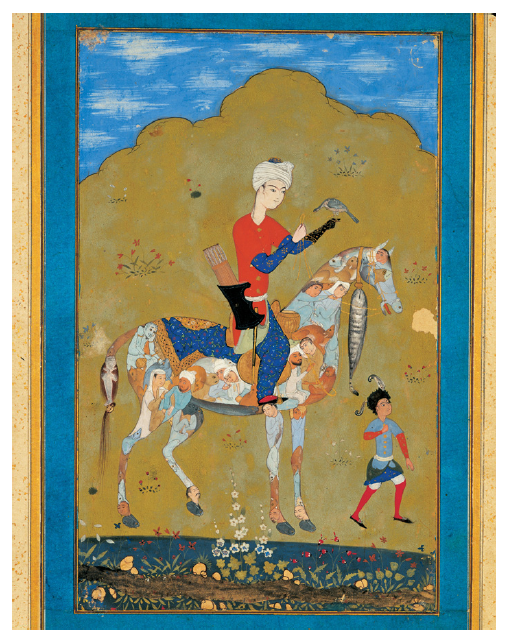
The conference focuses on the medieval and early modern periods (1000-1700 CE) as a crucial era for cross-cultural contact, challenging the lesser emphasis this period has received within “Silk Road” scholarship. It argues that viewing Eurasia merely as a space of intermittent object and idea exchange through trade or diplomacy depoliticizes cultural and goods spread, which is inadequate for understanding the political dynamics of these centuries dominated by the Mongol Empire and its successors. Emphasizing the role of political institutions in transregional history, the conference aims to integrate the study of cross-cultural contact with political history, highlighting Central Asia’s significance in the global political history of the medieval and early modern periods.
8:30 Tea and Coffee
9:00 Welcome Remarks
Panel 1
Who Should Rule? Institutions of Sovereignty and Succession
9:15 Christopher Atwood, University of Pennsylvania
The First Interregnum: Imperial Stake Holders in a (Temporarily) Khan-less World
9:45 Michael Bechtel, Nazarbaev University
Mongol Empire 1229-46: Frameworks of Rule and Redistribution (Related article is here)
10:15 Jonathan Brack, Northwestern University
Chinggisid Family Feuds, Islamization, and the Religious Sphere in Mongol-ruled Iran
10:45 Evrim Binbaş, University of Bonn
The Theater of Constitutional Ideas: The First Timurid Civil War and Shahrukh’s Ascension to Timur’s Throne
11:15 Discussion
11:45 Lunch break
Panel 2
How to Rule? Transcontinental Institutions
1:30 Carol Fan, University of Bonn
Revenue sharing networks within the Mongol Empire and transregional contacts
across Eurasia in the 13th and 15th centuries
2:00 Paehwan Seol, Chonnam National University
The Jarghu: Mobile Courts and Justice Networks of the Mongols throughout East-
West Asia during the 13th to 14th Centuries
2:30 Natalia Królikowska, University of Warsaw
Numerous Nogay peoples, the Circassians and innumerable Tatars’ influence on the decision-making process in the Crimean khanate.
3:00 Discussion
3:30 Tea and Coffee
Panel 3
What is Ruling? Conceptualizing State and Empire
3:45 David Sneath, University of Cambridge
The Lords’ Administration: Mongolian aristocratic governance and the state as social
relation
4:15 Munkh-Erdene Lhamsüren, National University of Mongolia
The Chinggisid Sovereignty: Myth, Archetype, and Transformation (see similar article here)
4:45 Kaveh Hemmat, Benedictine University
Rule of Law in Islamicate Civic Lore Concerning the Mongol Empire and China
5:15 Discussion
Graduate Student Colloquium in Armenian Studies at UCLA
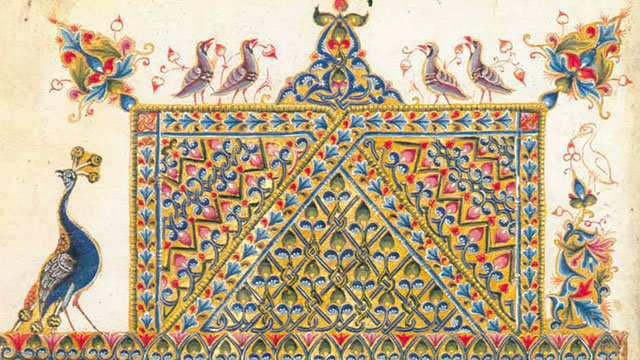
The above image is from one of the pages of the Gladzor Armenian Manuscripts. It was used last year at the 2023 graduate student colloquium
Royce Hall 314
Friday, February 16th, 2024
9:30 a.m.-10:00 Breakfast
10:00-10:10 Opening Remarks
Lori Pirinjian
Director of the 2024 Graduate Student Colloquium in Armenian Studies (Near Eastern Languages and Cultures, UCLA)
Dr. S. Peter Cowe
Narekatsi Professor of Armenian Studies (Near Eastern Languages and Cultures, UCLA)
Panel 1: Contemporary Policy in the Armenian Republic
Chair: Lori Pirinjian (UCLA)
10:10-10:30 Arev Papazian “Fishing Ban on Lake Sevan in Post-Soviet Armenian Republic” (Central European University, Vienna)
Read about the fishing ban here: https://www.azatutyun.am/a/32742178.html
10:30-10:40 Discussion
Panel 2: Modern Political Developments Chair: Lori Pirinjian (UCLA)
10:40-11:00 Orhun Yalcin, “The ARF in the Ottoman Empire” (Ludwig Maximilian University of Munich)
11:00-11:20 Kima Saribekyan, “Cilicia under the French Mandate” (Peter Pazmeny Catholic University, Budapest)
11:20-11:40 Nils Berliner, “Armenian Genocide in Germany” (Technical University of Berlin)
11:40-12:00 Levon-Leonidas Ntilsizian, “Aspects of Greece’s state policy towards the Armenian community in Greece (1945-1975)” (Panteion University, Athens)
12:00-12:25 Discussion
12:25-12:45 Coffee/Tea Break
Panel 3: Early Modern Armenian Communities
Chair: Martin Adamian (UCLA)
12:45-1:05 Andranik Nahapetian, “The Armenian Colony of Nor Nakhichevan” (Free University of Berlin)
1:05-1:25 Andranik Yesayan, “Demographic Transformations in Armenian Peripheral Canton Tavush Under Safavid and Ottoman Rule (1600-1725)” (Institute of History, The National Academy of Sciences of the Republic of Armenia)
1:25-1:40 Discussion
1:40-3:00 Lunch Break
Panel 4: Armenian Literary Practices in Late Antiquity and the Middle Ages Chair: Nora Bairamian (UCLA)
3:00-3:20 Lorenzo Colombo, “Censorship Greek-Armenian” (Universities of Pisa and Geneva)
3:20-3:40 Anush Apresyan, “The Spiritual-Cultural Significance of Translation: Nemesius of Emesa’s Treatise on Human Nature” (Matenadaran Institute, Yerevan)
3:40-4:00 Hayarpi Hakobyan, “Medieval Armenian Book Production in the Lake Van Region in 1275-1350: Scriptoria, scribes, manuscripts” (Martin Luther University of Halle- Wittenberg)
4:00-4:15 Discussion
4:15-4:35 Tea/Coffee Break
Panel 5: Medieval Trade across the Northern Hemisphere Chair: Arpi Melikyan (UCLA)
4:35-4:55 Francesca Cheli, “Chinese Pottery Imports” (University of Florence)
4:55-5:05 Discussion
Panel 6: 19th century Socio-Cultural Developments
Chair: Alexia Hatun (UCLA)
5:05-5:15 Aram Ghoogasian, “Learning to Read in the mid-19th Century” (Princeton University)
5:15-5:35 Emma Avagyan, “19th century Armenian-Jewish Revitalization” (University of Michigan, Ann Arbor)
5:35-5:55 Nazelie Doghramadjian, “Armenian Women’s Archives” (University of Michigan, Ann Arbor)
5:55-6:20 Discussion
6:20-6:35 Guest Speaker
Professor Shushan Karapetian
Director of the Institute of Armenian Studies, USC
6:35-8:00 Reception (Royce Hall 306)
Co-sponsored by Calouste Gulbenkian Foundation, National Association for Armenian Studies and Research, UCLA Department of Near Eastern Languages and Cultures, UCLA Promise Armenian Institute, UCLA Center for Near Eastern Studies, UCLA Center for European and Russian Studies, UCLA Center for Early Global Studies, UCLA Center for the Study of Religion, UCLA Stavros Niarchos Foundation Center for the Study of Hellenic Culture, UCLA Department of Classics, UCLA Leve Center for Jewish Studies, UCLA History Department.
For further details, please consult the website <nelc.ucla.edu>.
—
Svidok: A Story From Every Ukrainian
As the Russian invasion of Ukraine continues without a meaningful resolution in sight, Ukrainians continue to document the stories of Russian aggression in their country. One such project is Svidok. Svidok (свідок) means witness. The bilingual multimedia website allows Ukrainians to record their stories associated with Russian aggression. The purpose of recording is not only documenting their everyday lives but also to bear witness to history as it unfolds in their independent nation-state.
Below is a three-part screenshot of the Svidok’s website. The website also has a memorial board for the fallen heroes and the civilian victims.
Svidok’s self-description is below,
Svidok is your personal war journal. Where you can safely and securely store your experiences of living through the Russian invasion of Ukraine, and collect evidence of all the atrocities and war crimes that were committed by the Russians.
Svidok has been built by Ukraine’s proud citizens and friends in partnership with the AI for Good Foundation to ensure the truth of this war is accurately documented.
Про Свідок
Свідок – це ваш особистий щоденник війни. Ви можете безпечно та надійно зберігати свій досвід життя під час російського вторгнення в Україну та збирати докази всіх звірств та військових злочинів, які були скоєні росіянами.
Свідок був створений щирими громадянами та друзями України у партнерстві з Фундацією AI for Good, щоб гарантувати, що правда цієї війни буде точно задокументована.
New Digital Resource: Собрание законов и распоряжений правительства РСФСР и СССР= Collection of laws and orders of the government of the RSFSR and the USSR
Recently in light of Russian invasion of Ukraine, with almost everything Russian being canceled in society at large, I wanted to bring to our readers’ attention a new digital resource on the Collection of laws and orders of the government of the RSFSR and the USSR. The resource is in Russian, and it was created by the Elektronnaia biblioteka istoricheskikh dokumentov (Электронная библиотека исторических документов).
The source provides access to digital copies of the laws and various orders of the Russian Soviet Socialist Republic and Soviet Union. I hope historians of the Soviet Union and the Russian Federation will find this resource of academic interest.
One can search within the text using specific keywords.
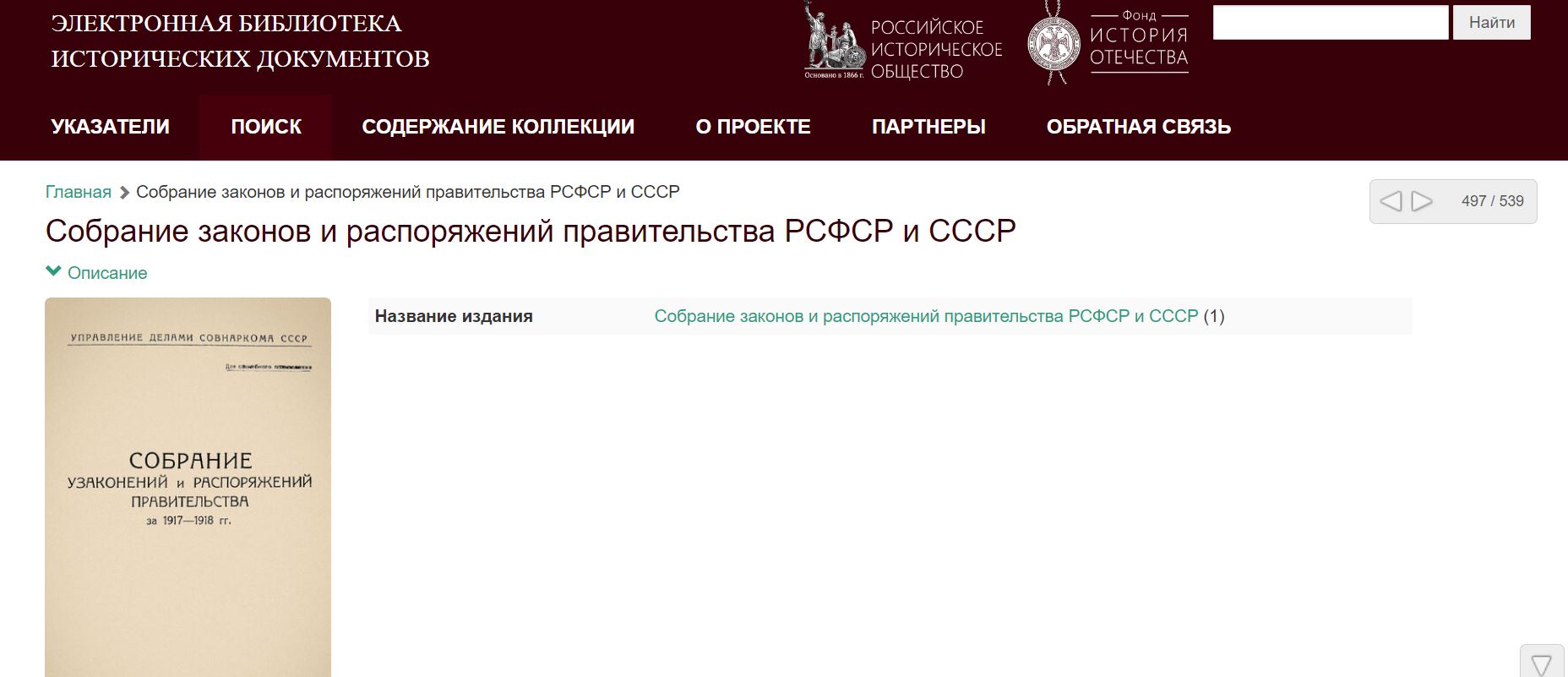
Center for Research Libraries releases Soviet-Era Ukrainian Newspapers Online
Center for Research Libraries in collaboration with the Global Press Archive of East View has released its latest digital collection of select Soviet-Era Ukrainian Newspaper. The collection can be accessed here: https://gpa.eastview.com/crl/seun/ or here
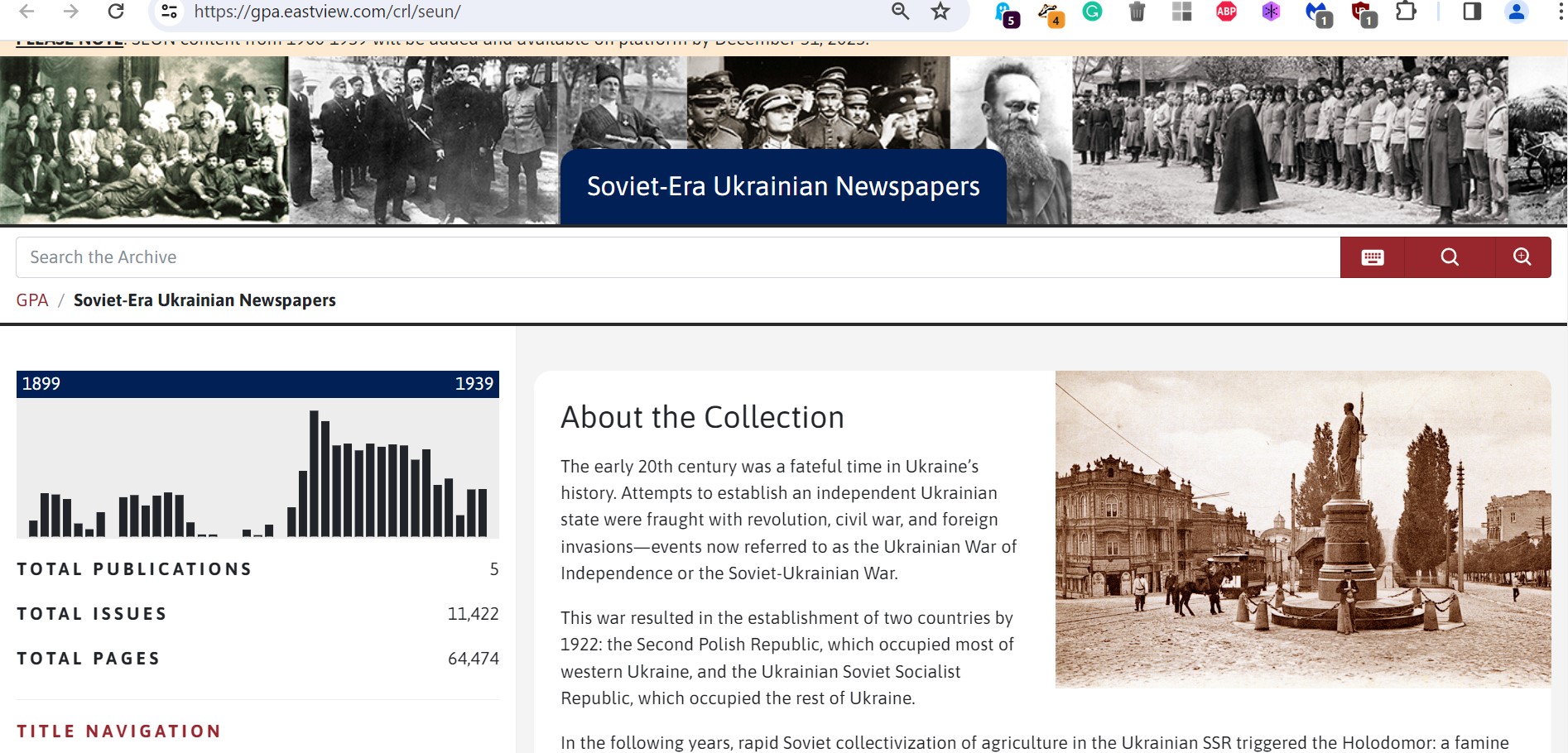
About the collection:
The early 20th century was a crucial time in Ukraine’s history, marked by attempts to establish an independent state, leading to the Ukrainian War of Independence. This conflict resulted in the creation of two countries by 1922: the Second Polish Republic in western Ukraine and the Ukrainian Soviet Socialist Republic in the rest of the country.
Following this, rapid Soviet collectivization in the Ukrainian SSR triggered the Holodomor, a famine that began in 1932 and claimed millions of lives.
The Soviet-Era Ukrainian Newspapers (SEUN) collection, with over 50,000 pages and five titles, documents Ukraine’s history during this turbulent period, including events leading up to WWII. It includes newspapers from Kyiv, Kharkiv, and Lviv, featuring content in both Ukrainian and Russian.
Sovetskii Ekran (Soviet Film) Digital Archive at UC Berkeley Library
The Library has purchased the Digital Archive of a Soviet film magazine: Sovetskii Ekran. The archive provides access to the full-text of journal issues that were published from 1925-1998.
Below is the screenshot of the landing page of the Sovietskii Ekran.

At the time of writing this blog, the digitization of issues was completed through 1970 and the additional digitization was in progress.
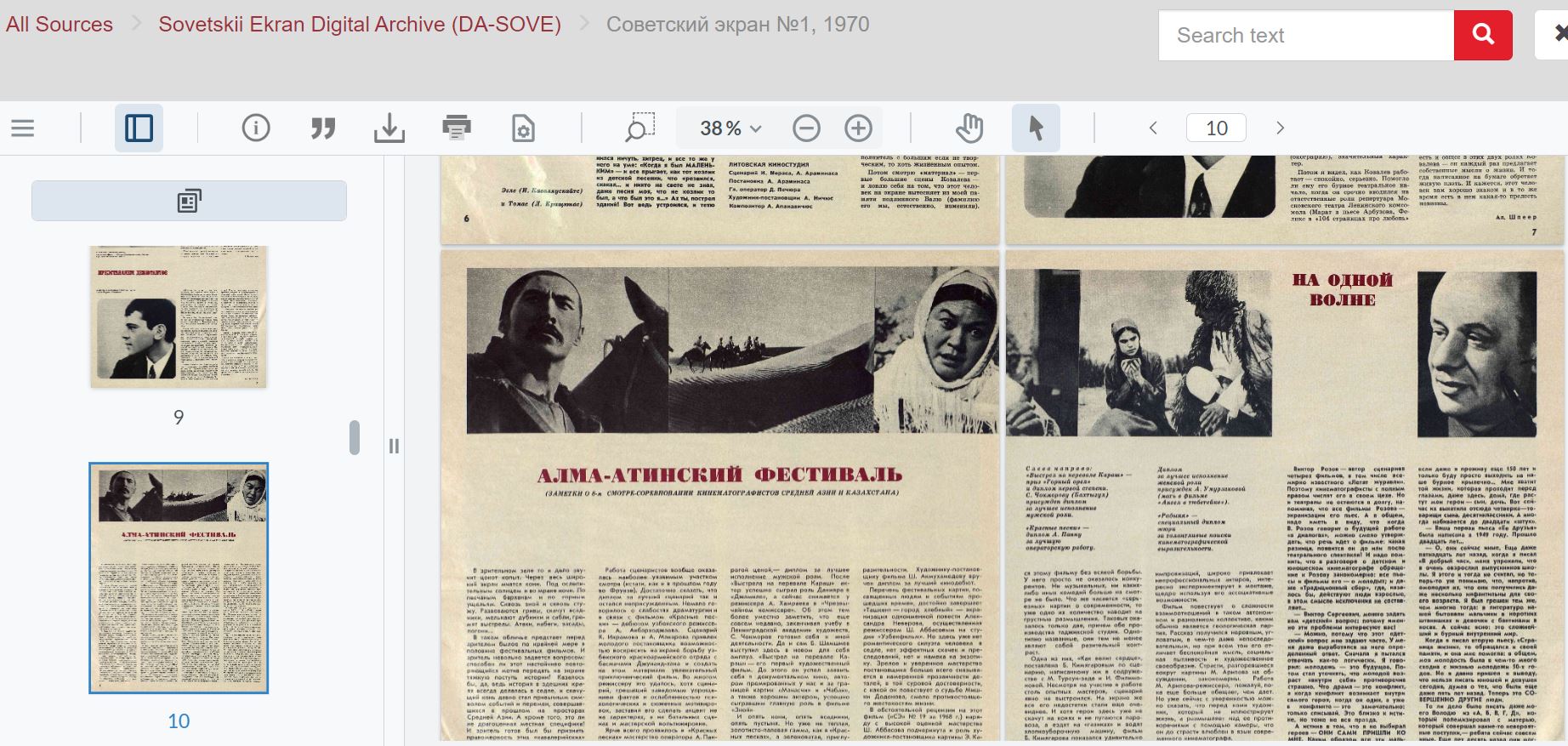
About the journal:
Soviet Screen was a magazine in the USSR that ran from 1925 to 1998 (with a break from 1941 to 1957). It talked about movies, both from the Soviet Union and other countries, cinema history, and had articles critiquing films. They also had reader polls each year to pick the best film, actor, actress, film for children, and music film.
The magazine had different names over the years, like Screen Film Gazeta in 1925, Cinema and Life in 1929–1930, Proletarian Cinema from 1931–1939, and Screen from 1991–1997. Before 1992, it was connected to the Union of Cinematographers of the USSR State Committee for Cinematography and the USSR.
In 1984, they printed 1.9 million copies. In 1991, the editor was Victor Dyomin, and the magazine was published under the title: Screen. It started coming out less often, monthly instead of more frequently. It kept going as Screen Magazine until 1997, then for a few months in 1997-1998, it went back to its old name-Soviet Screen. But it couldn’t survive the financial troubles in 1998 and had to stop publishing (Source: Wikip.).
Library Trial: Znamia Digital Archive (Soviet-era periodical)
At the library, we have set up a thirty-day trial of Znamia Digital Archive through November 18, 2023.
The extensive archive of Znamia (Знамя, Banner), a highly regarded Soviet/Russian “thick journal” (tolstyi zhurnal), covers more than nine decades and is a rich source of intellectual and artistic contributions. This monthly publication has been a vibrant platform for literature, critical analysis, philosophy, and, at times, political commentary.
Originally introduced in January 1931 as LOKAF (Локаф), an acronym for the Literary Association of the Red Army and Navy, the journal officially adopted the name Znamia, which translates to “Banner” in English, in 1933. Throughout its history, Znamia has played a crucial role in presenting the works of renowned authors such as Anna Akhmatova, Alexander Tvardovsky, Yevgeny Yevtushenko, Konstantin Paustovsky, Yuri Kazakov, and Yuri Trifonov.
During the era of Perestroika, starting in 1986, Znamia underwent a significant transformation and became one of Russia’s most widely read literary journals, serving as a herald of the Perestroika movement.
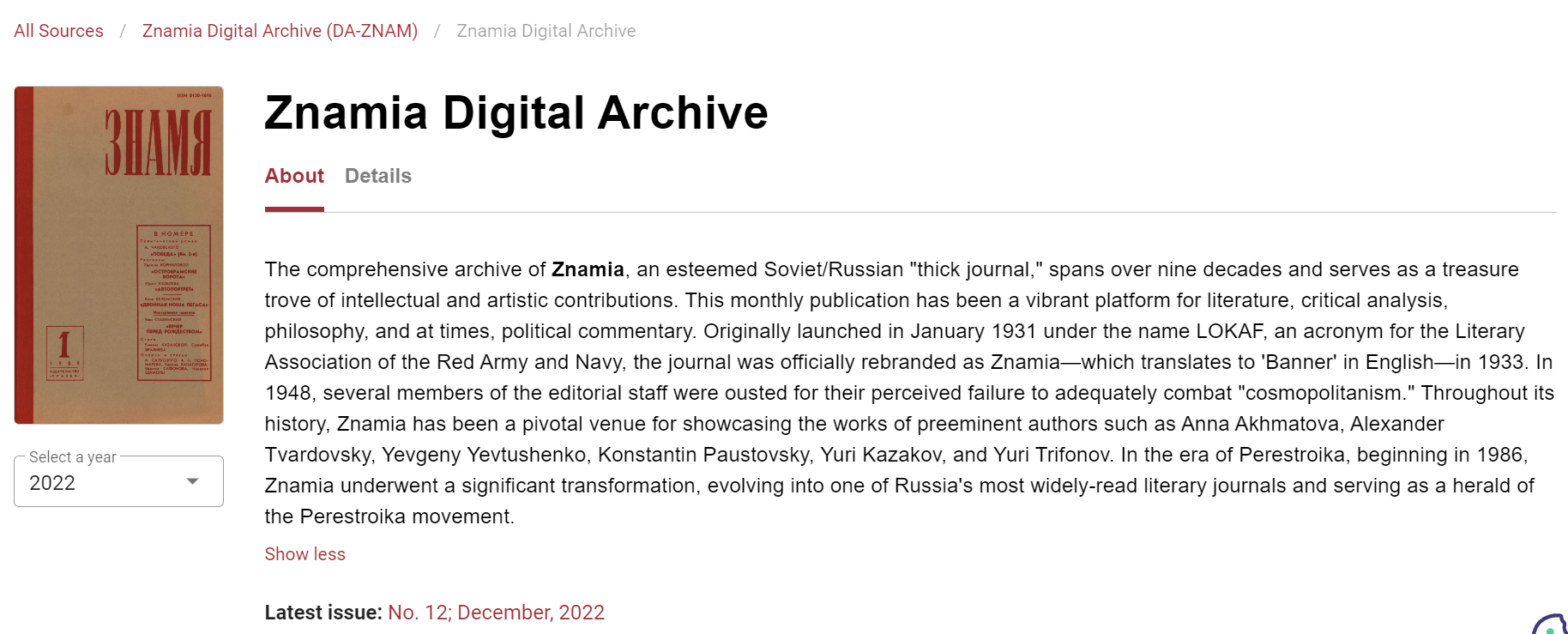
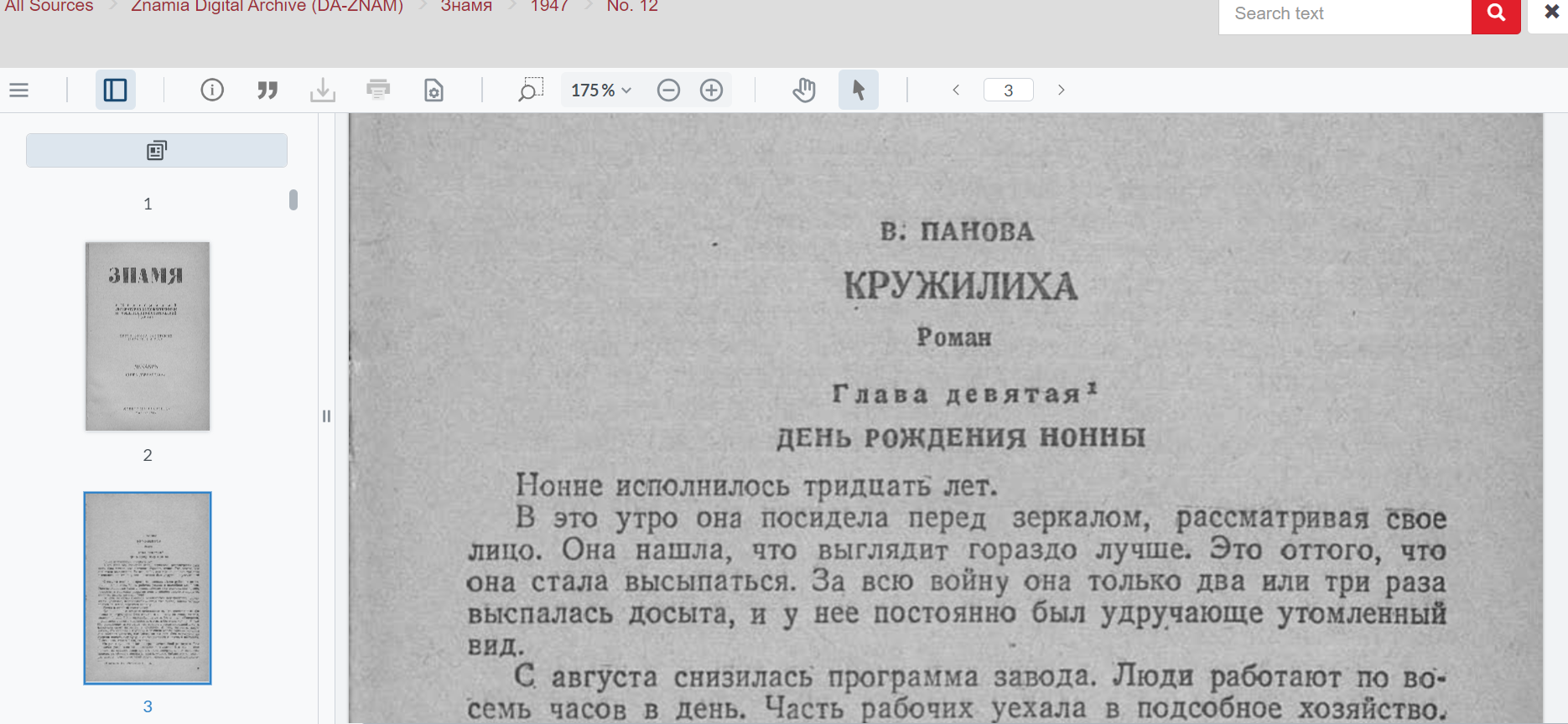
Access Link: https://libproxy.berkeley.edu/login?qurl=https%3A%2F%2Fdlib.eastview.com%2Fbrowse%2Fudb%2F6250
Third annual Hispanic Heritage Month Celebration Webinar at UC Berkeley Library
- Sarah Aponte; Chief Librarian, Dominican Studies Institute, CUNY
- Dr. Irma Guadarrama, former professor/ researcher and writer at Houston University–author of a 2023 book, “To Change the Impossible World: Central American Women in Struggle and Resistance.”
- Kathia Salome Ibacache, Librarian for Romance Languages
- David Woken, Latin American and Caribbean Studies Librarian, University of Chicago
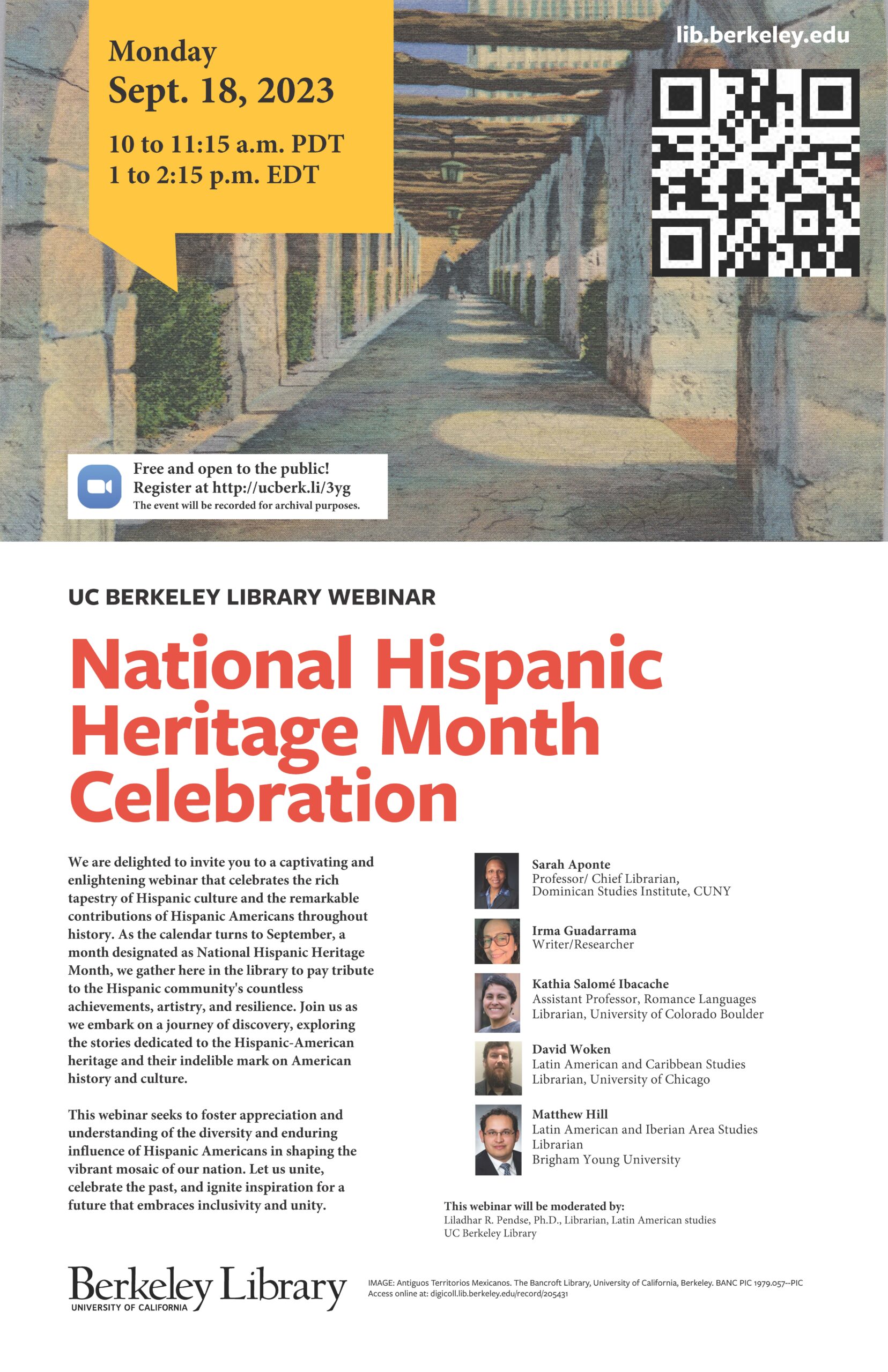
National Hispanic Heritage Month Celebration Webinar 2023 at UC Berkeley Library
